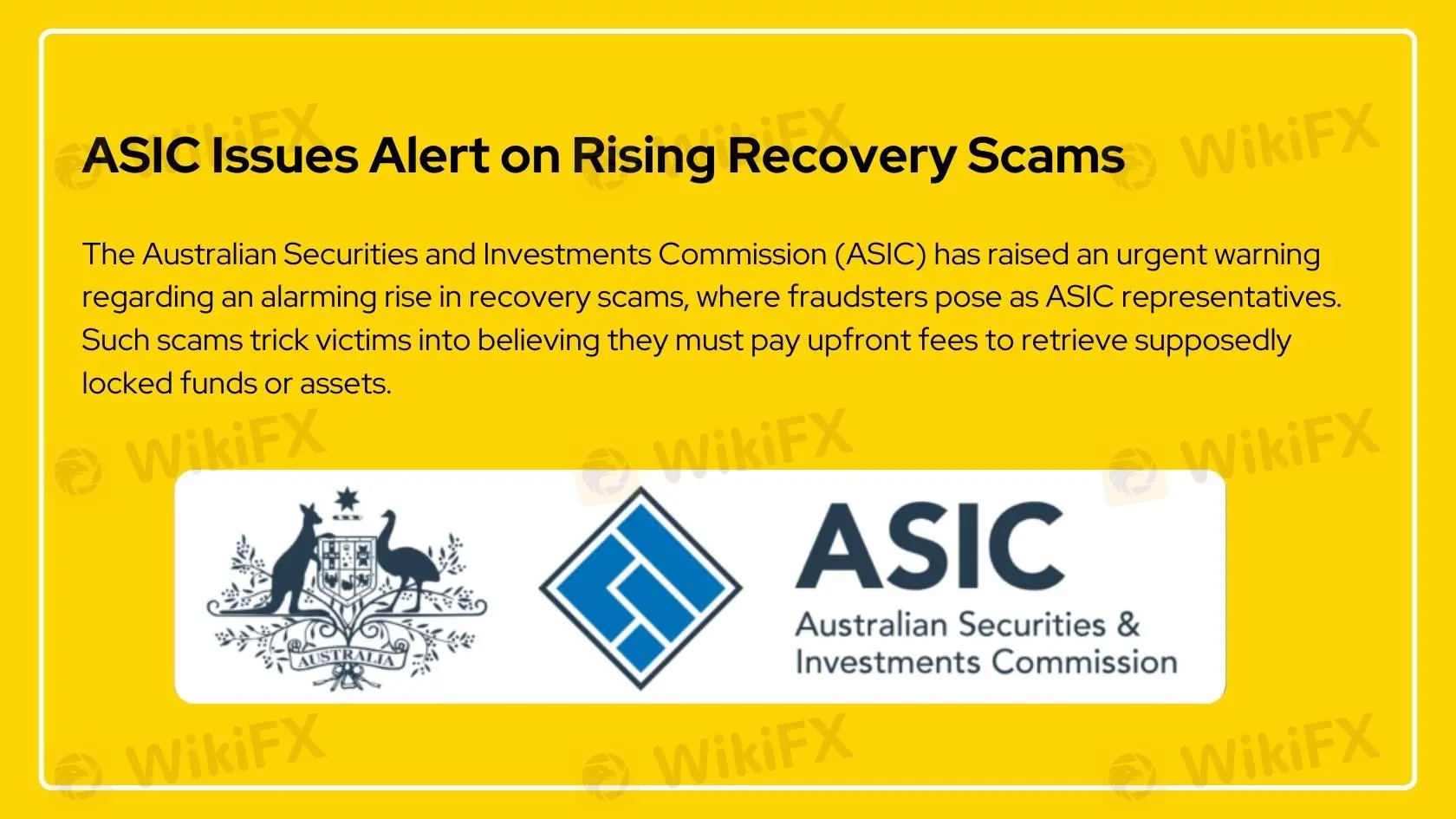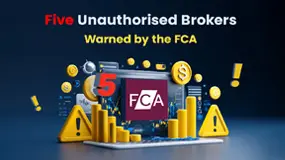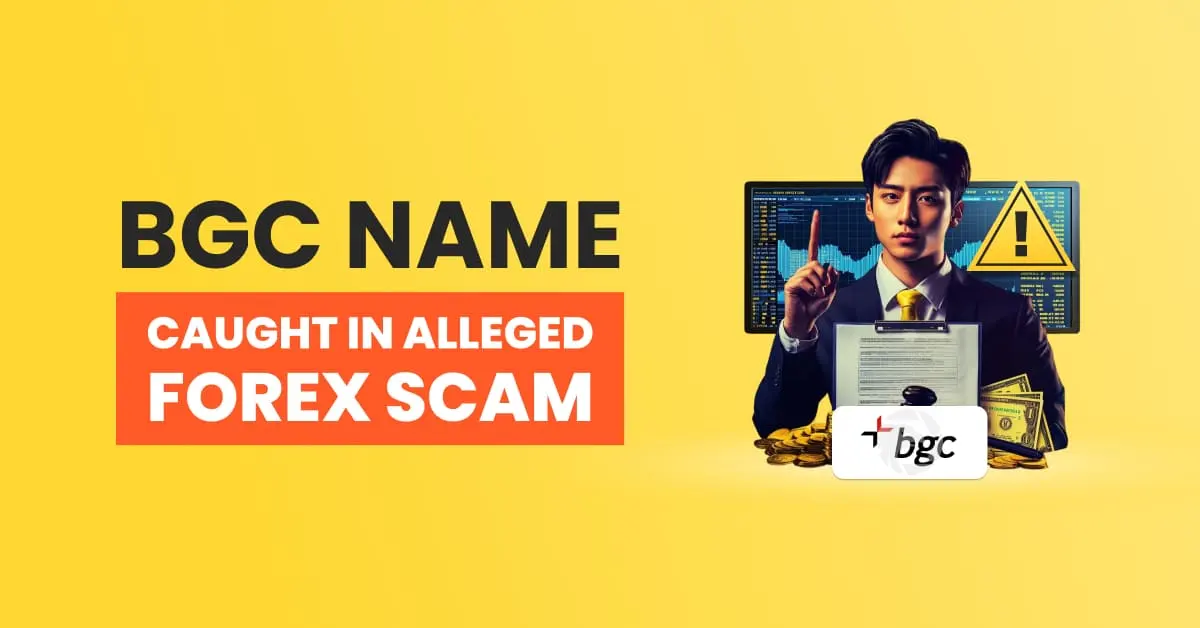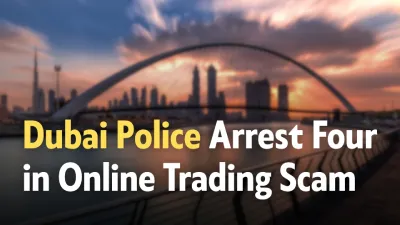简体中文
繁體中文
English
Pусский
日本語
ภาษาไทย
Tiếng Việt
Bahasa Indonesia
Español
हिन्दी
Filippiiniläinen
Français
Deutsch
Português
Türkçe
한국어
العربية
ASIC Issues Alert on Rising Recovery Scams
Abstract:The Australian Securities and Investments Commission (ASIC) has raised an urgent warning regarding an alarming rise in recovery scams, where fraudsters pose as ASIC representatives. Such scams trick victims into believing they must pay upfront fees to retrieve supposedly locked funds or assets.

Fraudulent Impersonation of ASIC
Scammers typically initiate contact via email, text messages, or phone calls, pretending to be from ASIC. In recent cases, scammers have specifically requested payments in US dollars to purportedly enable the release of investor funds. ASIC strongly clarifies it never charges fees for releasing assets or funds under any circumstances.
Recovery scams are particularly harmful because they target individuals already impacted by previous scams, exploiting their desperation to recover lost funds. ASIC emphasizes that investors should remain skeptical of anyone promising fund recovery in exchange for fees.
Recognizing and Avoiding Recovery Scams
ASIC emphasizes several key points to help investors spot these scams:
• No Payments Required: ASIC never demands payment in any currency—traditional or digital—including cryptocurrencies or stablecoins, to release locked funds or assets.
• Verifying Legitimacy: All official ASIC communications originate exclusively from email addresses ending in “@asic.gov.au”, and phone calls will only come from Australian numbers (country code +61).
• Unauthorized Use of ASIC Logo: Third-party entities are prohibited from using ASICs logo or claiming endorsement of services.
How to Respond if Contacted by Scammers
If you receive unsolicited communications claiming to be from ASIC:
• Immediately terminate the call or stop replying to emails or texts.
• Independently verify the contact by calling ASICs official number .
• Report suspicious activities to ASIC and Scamwatch.
Disclaimer:
The views in this article only represent the author's personal views, and do not constitute investment advice on this platform. This platform does not guarantee the accuracy, completeness and timeliness of the information in the article, and will not be liable for any loss caused by the use of or reliance on the information in the article.
Read more

iFourX: So Many Red Flags You Can’t Ignore
Forex trading has become difficult nowadays due to the frequent frauds occurring every day. You can’t blindly trust any broker . They may appear genuine and authorized but end up being scams. That’s why it’s more important to stay aware. To stay alert and informed, you need to know about a particular FX broker called iFourX and recognize its red flags.

Five Unauthorised Brokers Warned by the FCA
UK’s watchdog, the Financial Conduct Authority (FCA), recently issued a fraud alert against brokers who are operating without a license but still offering financial services. The FCA has identified these scam brokers and is warning the public not to engage with them. Check out the names of those brokers below.

BGC Name Caught in Alleged Forex Scam
Several traders have recently reported issues involving the name of forex broker BGC. It is still unclear whether BGC itself is directly involved or if scammers are illegally using the company’s brand to trick victims. Either way, the losses are real, and the number of complaints is growing.

Dubai Police Bust Online Trading Scam Syndicate, Arrest Four Fraudsters
Dubai Police arrest four individuals linked to fraudulent online trading schemes. The suspects targeted victims with unlicensed trading platforms, including forex and crypto fraud.
WikiFX Broker
Latest News
Does XS.com Hold Leading Forex Regulatory Licenses?
Chile Bumps Up Copper Price Forecast and Flags Lagging Collahuasi Output
Treasury yields tick lower as investors look ahead to Fed's interest rate decision
Thailand-Cambodia War Pressures Thai Baht in Forex Market
Investors Accuse Duttfx Markets of Scam: What You Should Know
A breakthrough and a burden? What the U.S.-EU trade deal means for the auto sector
Treasury yields flat as investors look ahead to Fed's interest rate decision
China's latest AI model claims to be even cheaper to use than DeepSeek
Bitget Lists Caldera for Spot Trading | What Should You Know?
Jim Cramer explains what's driving the stock of Tapestry
Currency Calculator


